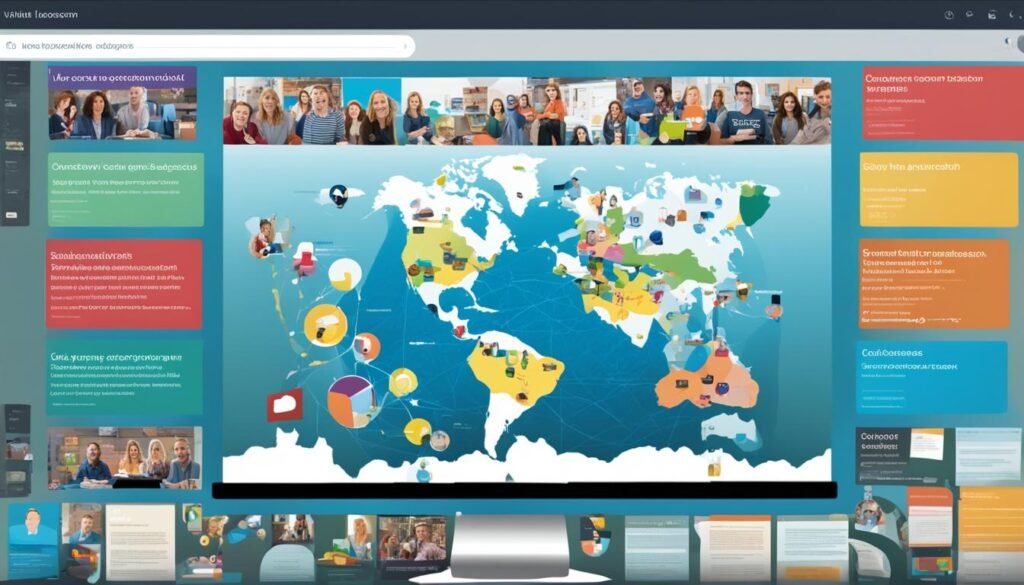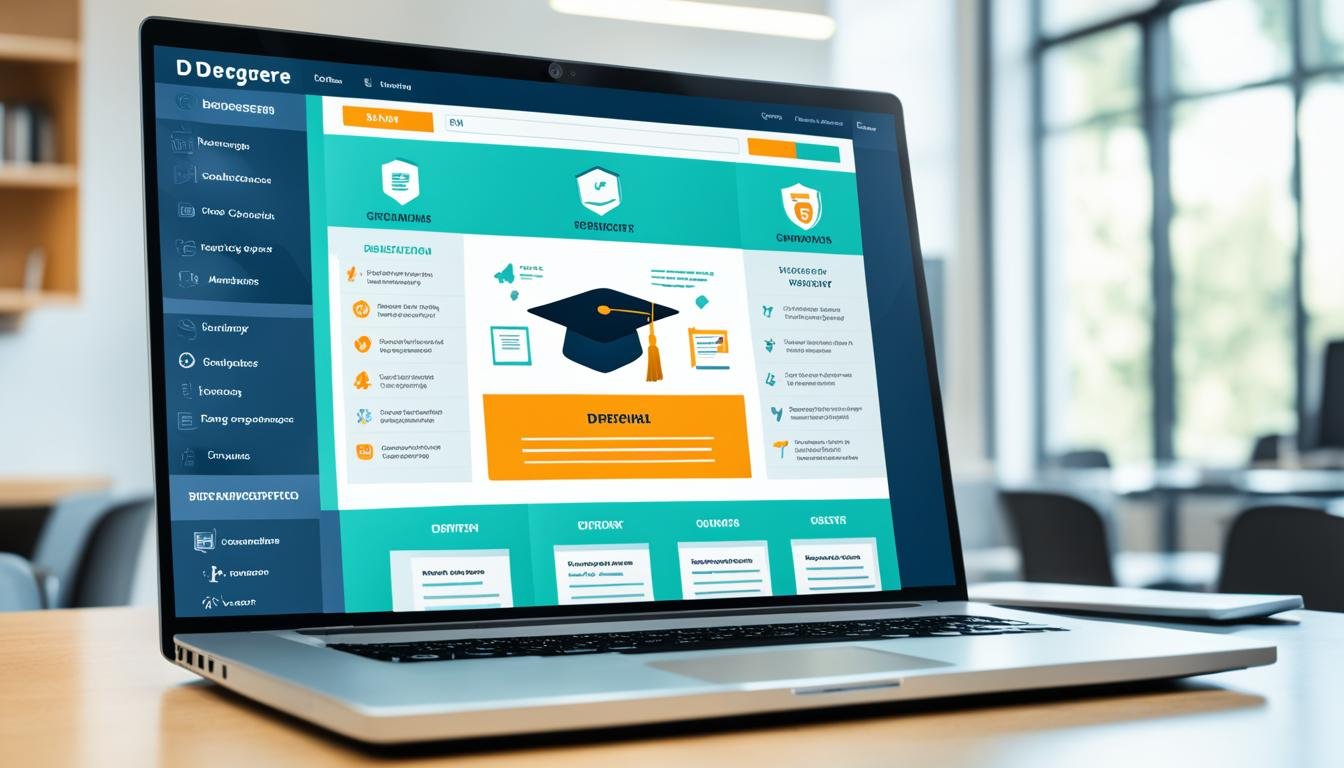Did you know that over 6 million students were enrolled in at least one online course in the United States in 2020? With the growing popularity of online degree programs, it is crucial to carefully evaluate and select the right program that aligns with your educational and career goals. This comprehensive checklist will guide you through the key factors to consider when evaluating online degree programs to ensure you make an informed decision.
Key Takeaways
- Understand the importance of evaluating online degree programs to ensure quality and success in your online education.
- Assess the academic content and curriculum to ensure it meets your educational needs and career aspirations.
- Evaluate the course design and instructional strategies to ensure an engaging and effective learning experience.
- Examine the communication and interaction opportunities within the online degree program to foster a collaborative and supportive learning environment.
- Verify the program’s alignment with institutional standards and accreditation requirements for online education.
Understanding the Significance of Online Degree Evaluation
Evaluating online degree programs is crucial to ensure the quality and success of your online education. By thoroughly assessing the program’s academic content, instructional design, and alignment with institutional and accreditation standards, you can make an informed decision that will set you up for a rewarding and successful online learning experience.
Ensuring Quality and Success for Your Online Education
When evaluating online degree programs, it is crucial to ensure that the program aligns with the institution’s standards and meets the necessary accreditation requirements. This includes verifying the program’s compliance with federal and state regulations, as well as the institution’s own policies and procedures for online education. By prioritizing online degree quality, course standards, and program accreditation, you can enhance your chances of student success in online learning.
Aligning with Institutional Standards and Accreditation Requirements
Institutional standards for online education and program accreditation are essential factors to consider when evaluating online degree programs. Ensuring that the program meets the necessary regulatory compliance and aligns with the institution’s quality standards will help you identify online courses and programs that prioritize the overall quality of the online learning experience.

Assessing the Academic Content and Curriculum
When evaluating an online degree program, it is essential to assess the academic content and curriculum to ensure it meets your educational needs and aligns with your career aspirations. Key factors to consider include the measurability and clarity of course goals and objectives, the alignment with established content standards, and the overall rigor, depth, and breadth of the course content.
Measurable Course Goals and Objectives
The online degree program’s course goals and objectives should be clearly defined, measurable, and aligned with your learning outcomes. This ensures that the program’s academic content is structured to effectively deliver the knowledge and skills you need to succeed in your chosen field.
Alignment with Established Content Standards
The online degree program’s curriculum should be aligned with relevant content standards, whether they are state, national, or industry-specific. This alignment ensures that the program’s content is of high quality and covers the essential knowledge and skills required for your field of study.
Rigor, Depth, and Breadth of Course Content
The online degree program’s course content should demonstrate a sufficient level of rigor, depth, and breadth to effectively teach the standards being addressed. This ensures that you receive a comprehensive and challenging educational experience that prepares you for your future academic or professional endeavors.
Integration of Information Literacy and Communication Skills
Effective online degree programs should integrate the development of information literacy and communication skills as an integral part of the curriculum. These skills are essential for success in the 21st-century job market and should be woven throughout the course content and learning activities.

How to evaluate online degree programs
Evaluating the design and instructional strategies of an online degree program is crucial to ensure an engaging and effective learning experience. Key factors to consider include the program’s understanding of student needs, the organization and structure of the course, and the incorporation of active learning activities and diverse instructional approaches.
Evaluating Course Design and Instructional Strategies
Effective online degree programs should demonstrate a deep understanding of student needs and incorporate instructional strategies that cater to the unique requirements of online learning. This includes organizing the course content in a logical and user-friendly manner, providing clear learning objectives, and leveraging a variety of instructional methods such as multimedia presentations, interactive simulations, and project-based learning.
Assessing Student Engagement and Active Learning
Effective online degree programs should promote student engagement and active learning through the integration of interactive learning activities, opportunities for student-to-student and student-to-instructor communication, and the incorporation of meaningful and authentic learning experiences. This ensures that students actively participate in the learning process and develop a deeper understanding of the course material.
Examining Communication and Interaction Opportunities
Evaluating the communication and interaction opportunities within an online degree program is crucial to ensure a collaborative and supportive learning environment. This includes assessing the availability of discussion forums, synchronous chat sessions, and other avenues for students to engage with their instructors and peers, fostering a sense of community and facilitating the exchange of ideas.

Conclusion
Evaluating online degree programs is a critical step in ensuring a successful and rewarding educational experience. By thoroughly assessing the academic content and curriculum, the alignment with institutional and accreditation standards, the instructional design and strategies, and the communication and interaction opportunities, you can make an informed decision that aligns with your educational and career goals.
The quality of your online education is paramount, and the process of online degree program evaluation is crucial in determining the suitability of a program for your needs. Carefully examining the online education quality factors ensures that you make the right choice and set yourself up for academic and professional success.
Ultimately, the decision to pursue an online degree program is a significant one, and taking the time to thoroughly evaluate your options will enable you to make an informed decision that aligns with your educational and career goals. By following the comprehensive checklist and guidelines outlined in this article, you can navigate the online degree landscape with confidence and find the program that best fits your aspirations.
Source Links
- https://topkit.org/evaluating/checklists-rubrics/
- https://www.sreb.org/sites/main/files/file-attachments/06t06_checklist_for_evaluating-online-courses.pdf?1565877040
- https://uwm.edu/cetl/evaluation-checklist-for-online-courses/


